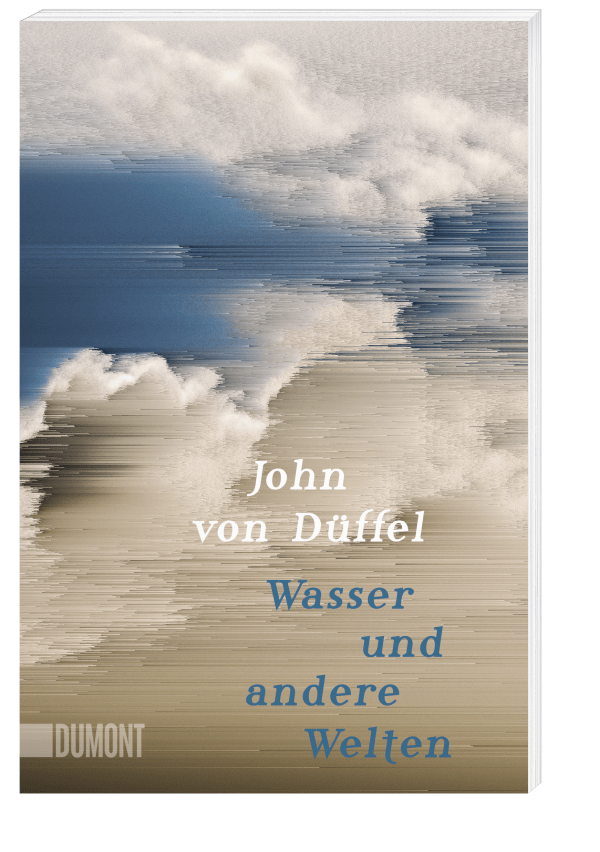

Neue Gedanken zum Verhältnis von Literatur und Klimawandel
JOHN VON DÜFFEL
WASSER UND ANDERE WELTEN/
WATER AND OTHER WORLDS
Essays, ca. 160 pages;
completely revised new edition
Spring 2021
"A small lake, a dead old man and the revolt of the young: John von Düffel cleverly process-es lust for swimming, loss of parents and fear of climate change into a great contemporary novel. [...] Düffel never lapses into an apocalyptic furor, and yet the fear of climate change and the resulting distortions between the generations has deeply inscribed itself in his novel."
Christian Buß, DER SPIEGEL on "Der brennende See"
“‘We always come back to the water’ is the first sentence I ever wrote in prose.” John von Düffel
Ever since his debut novel Vom Wasser, water has been central to the writing of passionate swimmer John von Düffel. Water is the dominant theme in his life, a fixed constant, even if his view of rivers, lakes and seas has changed many times over the course of his two decades as a novelist, dramaturge and essayist. But these days the context in which he is writing is a completely different one, because what seemed to be available in such abundance twen-ty years ago is now in much shorter supply. Humankind is changing the climate, and water is becoming a scarce and precious resource. For John von Düffel, recasting the relationship between humankind and nature is not only a political but also a poetic challenge, which he first took up in his novel Der brennende See, published in early 2019.
Following on from this novel, he has put together Wasser und andere Welten, a collection of eighteen texts about swimming, writing and reading. Some are poetic, some autobiographical, some old and some new. John von Düffel addresses the disappearance of water as a literary matter of conscience: in the age of climate change, what should we be writing about and what should we remain silent about? Do we need a new poetics for describing nature? In an allu-sion to Bertolt Brecht’s poem ‘To Those Born After’, John von Düffel addresses one of his questions to his contemporaries:
What times are these, when silence about trees is almost a crime, because it prevents a conversation about so many misdeeds?
WASSER UND ANDERE WELTEN/
WATER AND OTHER WORLDS
Essays, ca. 160 pages;
completely revised new edition
Spring 2021
"A small lake, a dead old man and the revolt of the young: John von Düffel cleverly process-es lust for swimming, loss of parents and fear of climate change into a great contemporary novel. [...] Düffel never lapses into an apocalyptic furor, and yet the fear of climate change and the resulting distortions between the generations has deeply inscribed itself in his novel."
Christian Buß, DER SPIEGEL on "Der brennende See"
“‘We always come back to the water’ is the first sentence I ever wrote in prose.” John von Düffel
Ever since his debut novel Vom Wasser, water has been central to the writing of passionate swimmer John von Düffel. Water is the dominant theme in his life, a fixed constant, even if his view of rivers, lakes and seas has changed many times over the course of his two decades as a novelist, dramaturge and essayist. But these days the context in which he is writing is a completely different one, because what seemed to be available in such abundance twen-ty years ago is now in much shorter supply. Humankind is changing the climate, and water is becoming a scarce and precious resource. For John von Düffel, recasting the relationship between humankind and nature is not only a political but also a poetic challenge, which he first took up in his novel Der brennende See, published in early 2019.
Following on from this novel, he has put together Wasser und andere Welten, a collection of eighteen texts about swimming, writing and reading. Some are poetic, some autobiographical, some old and some new. John von Düffel addresses the disappearance of water as a literary matter of conscience: in the age of climate change, what should we be writing about and what should we remain silent about? Do we need a new poetics for describing nature? In an allu-sion to Bertolt Brecht’s poem ‘To Those Born After’, John von Düffel addresses one of his questions to his contemporaries:
What times are these, when silence about trees is almost a crime, because it prevents a conversation about so many misdeeds?
Rights inquiries
John von Düffel
John von Düffel was born in Göttingen in 1966, he works as a dramaturg at Deutsches Theater Berlin and is professor for scenic writing at the Berlin...
John von Düffel was born in Göttingen in 1966, he works as a dramaturg at Deutsches Theater Berlin and is professor for scenic writing at the Berlin University of the Arts. He has published novels and story collections with DuMont since 1998, including 'Vom Wasser' (1998), 'Houwelandt' (2004), 'Wassererzählungen' (2014), 'Das Klassenbuch' (2017), 'Der brennende See' (2020) 'Wasser und andere Welten' (new edition 2021) and most recently ‘Die Wütenden und die Schuldigen’ (2021). His works have...
